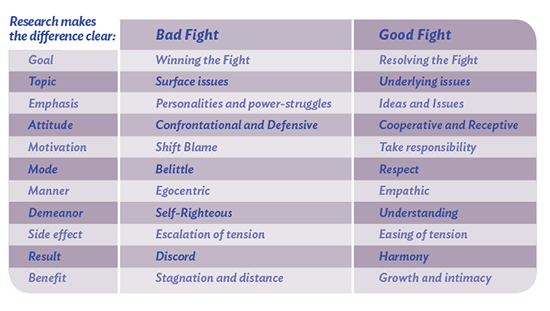
October-November 2014
What's Next for Home Missions?
------------------
|

The Good Fight
By Les & Leslie Parrott
It was a circular conversation over who was pulling more weight on the home front. In short, we were having a chore war. And each of us had drawn a battle line. We both dug in our heels and were dead set on proving the other person wrong.
“It would be nice if you could actually lend a hand on occasion,” Leslie said, sardonically.
“Seriously?” Les retorted. “You’re actually going to say I don’t help out?”
“Do I need to?”
“Apparently!”
“Okay, then, you don’t help out.”
“What do you want me to do that I’m not doing?” Les asked the question as if Leslie would have to think long and hard to answer it. She didn’t.
“How many do you want?
“C’mon.”
“Let’s start with taking out the trash?”
“I do take it out!”
“Then why did we have a heaping pile of trash in our garage for the past two weeks?”
“Oh, that’s rich! You know I was traveling and…”
“And you didn’t take it out before you left.”
We jabbered on like this throughout the day, hopscotching to various chores—cleaning bathrooms, yard work, and so on. And when we weren’t talking about it, we were building up our cases and reloading our ammunition for when the battle ensued once again. Each of us was far more concerned with winning the fight than with resolving it. We were in a serious power-struggle, a world-class game of blame, and dangerously close to belittling each other with true contempt. In short, we were having an honest to goodness bad fight.
Of course, we didn’t really know it at the time. In fact, early in our marriage we didn’t even make a distinction between a good fight and a bad fight. We just thought a fight was a fight. But that’s far from true. To deal effectively with any conflict, a couple has to know the difference between a good fight and a bad fight.
When the Gloves Come Off
Professionals used to believe that couples who were more prone to arguments were the least satisfied with their marriage. The studies that led to those findings, however, failed to distinguish among the kinds of fights the couples were having. Truth be told, the difference between a marriage that gets happier as times goes on and one that grows more miserable is not whether the couple fights but how they fight.

All fights are not created equal. A “good fight” in contrast to a “bad fight” is helpful, not hurtful. A good fight stays clean while a bad fight gets dirty. Ninety-three percent of couples who fight dirty will be divorced in ten years, according to researchers at the University of Utah. In the end, bad fights lead to marriages that are barely breathing and eventually die.
In fact, researchers now predict with 94% accuracy whether a couple will stay together or not based solely on how they fight. Not whether they fight, but how they fight. The line separating good fights from bad is not fuzzy.
Pride Fighting
The Bible says it straight: “Pride leads to conflict” (Proverbs 13:10). It’s that simple. A prideful spirit keeps us from cooperating, flexing, respecting, compromising, and resolving. Instead, it fuels defensiveness and discord. It stands in the way of saying “I’m sorry.” It lives by the motto, “The only unfair fight is the one you lose.” Self-centered pride is at the heart of every bad fight.
Let’s be clear: healthy pride, the pleasant emotion of being pleased by our work, is quite different from unhealthy pride, in which our egos are bloated. The latter is laced with arrogance and conceit. And that’s what we’re talking about here.
We don’t have to be egomaniacs to suffer from unhealthy pride. It has a way of secretly seeping into the crevices of our conflicts even when we make a conscious effort to avoid it. That’s what makes it so toxic and devious. “Through pride we are ever deceiving ourselves,” said Carl Jung. “But deep down below the surface of the average conscience a still, small voice says to us, something is out of tune.”
You know the feeling of being out of tune. We all do. It’s born of the tension between being the kind of person we want to be and our fear of being snookered. We don’t want to be prideful, but we also don’t want to be duped. That’s what causes pride to kick in. That’s when we realize, deep down, that we’ve taken the low road. More often than not, this sinking feeling becomes even more difficult to admit to ourselves, let alone our spouse, so we perpetuate the pride.
The antidote to unhealthy pride is humility. The word from which we get humility literally means “from the earth.” In other words, humility steps off its high horse to be common and lowly. Humility isn’t for cowards. It’s risky. Humility makes us vulnerable to “being played” or made to look the fool. But it also makes possible everything else we truly want to be.
William Gurnall said, “Humility is the necessary veil to all other graces.” Without humility, it’s nearly impossible to engender kindness and warmth with our spouse. Without humility it’s impossible to fight a good fight—the kind that brings you closer together.
About the Writers: Les and Leslie Parrott are New York Times best-selling authors and co-directors of The Center for Relationship Development at Seattle Pacific University. Their books include Saving Your Marriage Before It Starts, Love Talk, and The Good Fight. Visit www.LesandLeslie.com. |
|

